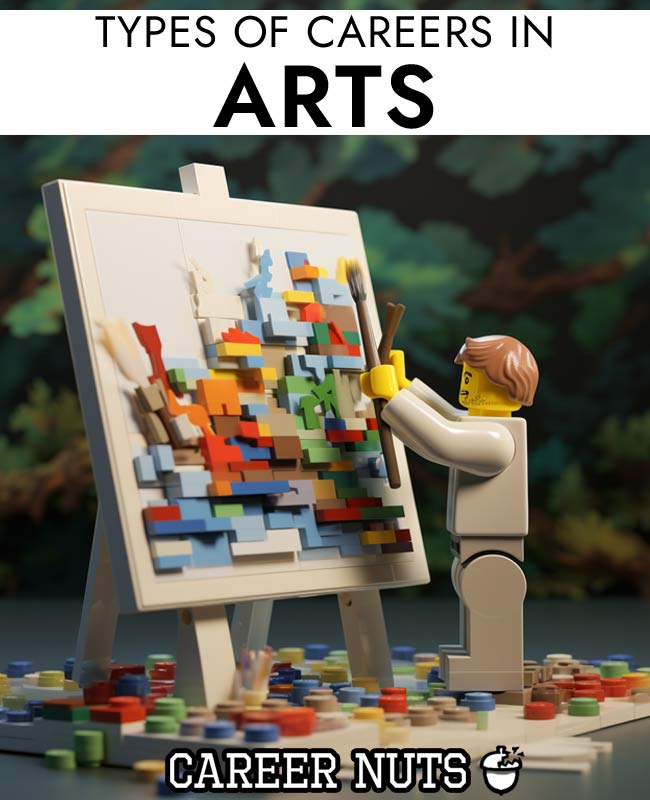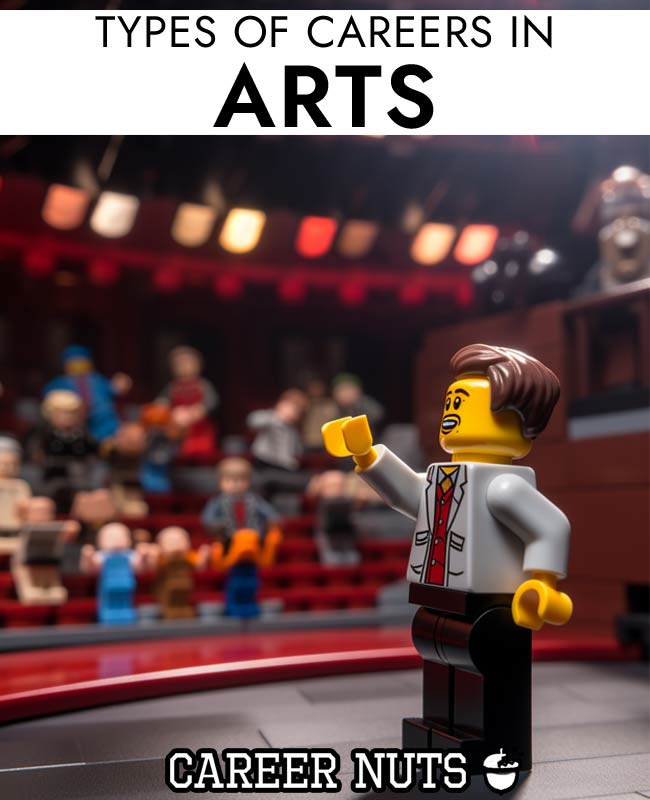Explore diverse careers in arts, from painting to curating, and discover the opportunities to express creativity, contribute to culture, and make a lasting impact.

From visual arts to performing arts, from writing to design, there are abundant opportunities for individuals to forge a rewarding path in this dynamic industry. In this article, we will delve into different careers in arts, each with its distinct set of responsibilities, skills, and educational requirements.
From the brushstrokes of a painter to the melodies of a musician, these careers contribute to the cultural fabric of society, enriching our lives and challenging our perspectives. Whether you aspire to become a curator, a graphic designer, or an art therapist, the arts industry welcomes those who possess a passion for creativity and a dedication to honing their craft. So, let us embark on this enlightening journey into the world of careers in arts.
Fine Arts
Art Director
As an Art Director, your job is to oversee the visual style and artistic direction of a project. Responsibilities include managing a team of artists, providing creative guidance, and ensuring the project’s visual elements align with the overall vision. Required skills include strong leadership, excellent artistic abilities, and a keen eye for detail. A bachelor’s degree in fine arts or a related field is typically required. You will use design software, such as Adobe Creative Suite, to create and modify visual elements.
Ceramic Artist
As a Ceramic Artist, your job involves creating unique ceramic pieces through various techniques like wheel throwing, hand-building, and glazing. You are responsible for designing, shaping, and firing clay into functional or decorative objects. Key skills include creativity, knowledge of ceramic techniques, and an understanding of different firing methods. A degree in fine arts or ceramics is beneficial, and you’ll use pottery tools, kilns, and glazes in your work.
Illustrator
As an Illustrator, your main responsibility is to create visual representations that accompany text in books, magazines, advertisements, or digital media. Key skills include artistic talent, the ability to interpret and convey ideas visually, and proficiency in digital illustration software like Adobe Illustrator. A degree in illustration or a related field can enhance your prospects in this field.
Painter
As a Painter, your job is to create artwork using various painting techniques and mediums such as oil, acrylic, or watercolor. Responsibilities include selecting subjects, mixing colors, and applying paint to canvas or other surfaces. Strong artistic skills, creativity, and a good understanding of color theory are essential. While formal education is not always required, a degree in fine arts can provide a solid foundation.
Performing Arts

Choreographer
As a Choreographer, your primary responsibility is to create and direct dance routines for performances, shows, or films. You will collaborate with dancers, select music, and develop movements that convey a desired message or emotion. Key skills include a strong background in dance, creativity, and leadership abilities. A degree in dance or performing arts is advantageous.
Musician
As a Musician, your job is to create and perform music using your chosen instrument or voice. Responsibilities include practicing, composing, and performing in various settings such as concerts, recordings, or live shows. Excellent musical talent, proficiency in your chosen instrument, and the ability to work well with others are vital. Formal education in music or a related field can be beneficial, but practical experience and skill development are crucial.
Stage Director
As a Stage Director, you are responsible for overseeing all aspects of a theatrical production, including coordinating actors, set design, lighting, and sound. Your job involves interpreting the script, organizing rehearsals, and ensuring a cohesive performance. Strong leadership, organizational skills, and a deep understanding of theatrical elements are essential. A degree in theater arts or a related field can provide valuable knowledge and training.
Voice Actor
As a Voice Actor, your main responsibility is to provide voices for animated characters, commercials, audiobooks, or video games. Your job involves interpreting scripts, developing character voices, and delivering performances that bring characters to life. Essential skills include vocal range, acting abilities, and the capacity to convey emotions through voice alone. While formal education is not always required, voice acting workshops or classes can be beneficial.
Design
Fashion Designer
As a Fashion Designer, your create original clothing and accessories. Responsibilities include sketching designs, selecting fabrics, and overseeing the production process. Key skills include creativity, a keen eye for trends, and the ability to translate ideas into tangible designs. A degree in fashion design or a related field is typically preferred, and you’ll use design software like Adobe Photoshop or Illustrator.
Costume Designer
As a Costume Designer, your job involves creating and designing costumes for films, television shows, or theater productions. Responsibilities include researching historical periods, collaborating with directors or production teams, and selecting or creating costumes that reflect characters’ personalities and the production’s overall vision. Key skills include a deep understanding of fashion history, textile knowledge, and the ability to work within budgetary constraints. A degree in fashion design or costume design is often preferred.
Graphic Designer
As a Graphic Designer, your main responsibility is to create visual concepts for various mediums, such as advertisements, logos, websites, or packaging. You will use your creative skills and software like Adobe Creative Suite to develop visually appealing designs that effectively communicate messages. A degree in graphic design or a related field is often required, along with a strong portfolio showcasing your design abilities.
Interior Designer
As an Interior Designer, your job involves creating functional and aesthetically pleasing interior spaces for residential or commercial clients. Responsibilities include understanding clients’ needs, selecting furniture and materials, and overseeing the implementation of the design plan. Key skills include creativity, spatial awareness, and a good understanding of color and texture. A degree in interior design or a related field is typically required, and you’ll use design software and drafting tools.
Web Designer
As a Web Designer, your main responsibility is to create visually appealing and user-friendly websites. Your job involves designing page layouts, selecting color schemes, and creating graphics that enhance the user experience. Key skills include proficiency in web design software like Adobe XD or Sketch, knowledge of HTML and CSS, and a strong eye for detail. A degree in web design or a related field is advantageous.
Media and Communication
Art Critic
As an Art Critic, your primary responsibility is to analyze and evaluate artworks, providing insights and critiques that help the public understand their cultural and artistic significance. Key result areas include writing reviews, conducting research, and engaging in art discussions. Strong analytical and writing skills, along with a deep understanding of art history and theory, are essential. A degree in art history, journalism, or a related field is typically required.
Film Director
As a Film Director, your job involves overseeing the creative aspects of a film production. Responsibilities include interpreting the script, guiding actors and crew, and ensuring the overall artistic vision is achieved. Key skills include leadership, storytelling abilities, and a strong understanding of cinematography and film techniques. While formal education is not always required, a degree in film or a related field can be beneficial.
Journalist
As a Journalist specializing in arts, your main responsibility is to report on artistic events, trends, and personalities. Your job involves conducting interviews, writing articles, and capturing the essence of art-related stories. Key skills include strong writing abilities, research skills, and a passion for the arts. A degree in journalism or a related field is typically required, and proficiency in digital media tools is beneficial.
Public Relations Manager
As a Public Relations Manager specializing in arts, your job involves promoting artists, events, or creative organizations. Responsibilities include developing strategic communication plans, organizing press releases, and fostering positive relationships with the media and the public. Key skills include excellent communication, networking abilities, and a good understanding of the arts industry. A degree in public relations or a related field is often required.
Education and Training
Art Teacher
As an Art Teacher, your primary responsibility is to educate and inspire students in various art forms and techniques. Your job involves planning lessons, demonstrating art techniques, and guiding students in their creative journey. Key skills include teaching abilities, a deep understanding of art principles, and the ability to foster a positive learning environment. A degree in art education or a related field is typically required.
Dance Instructor
As a Dance Instructor, your job is to teach students different dance styles and techniques. Responsibilities include planning lessons, choreographing routines, and providing constructive feedback to help students improve. Key skills include expertise in various dance forms, patience, and the ability to motivate and inspire students. A degree in dance education or a related field can be advantageous.
Music Teacher
As a Music Teacher, your main responsibility is to provide instruction in music theory, techniques, and performance. Your job involves planning lessons, teaching students to play instruments or sing, and organizing recitals or performances. Essential skills include proficiency in your chosen instrument, a deep understanding of music theory, and the ability to connect with and motivate students. A degree in music education or a related field is typically required.
Curatorial and Preservation
Archivist
As an Archivist, your job is to manage and preserve historical documents, photographs, or records. Responsibilities include organizing and cataloging materials, ensuring their proper storage and handling, and providing access to researchers. Key skills include attention to detail, organizational abilities, and knowledge of archival practices and software. A master’s degree in library science or a related field is often required.
Curator
As a Curator, your primary responsibility is to develop and manage collections of artworks, artifacts, or historical objects. Your job involves researching, acquiring, and displaying pieces that align with a museum or gallery’s vision. Key skills include knowledge of art history, curatorial expertise, and the ability to collaborate with artists and stakeholders. A master’s degree in art history or museum studies is typically required.
Art Conservator
As an Art Conservator, your primary responsibility is to preserve and restore artworks, ensuring their longevity and maintaining their aesthetic integrity. Your job involves examining artworks, developing conservation plans, and performing necessary treatments to stabilize and repair damages. Key skills include knowledge of art history, expertise in conservation techniques and materials, and attention to detail. A master’s degree in art conservation or a related field is typically required.
Paper Conservator
As a Paper Conservator, your job is to preserve and restore paper-based artworks, such as drawings, prints, or manuscripts. Responsibilities include examining and documenting the condition of paper artworks, performing treatments to stabilize and repair damages, and ensuring proper storage and handling. Key skills include expertise in paper conservation techniques, knowledge of archival materials, and a meticulous approach to work. A master’s degree in paper conservation or a related field is often required.
Entertainment and Events
Event Planner
As an Event Planner specializing in arts events, your job involves organizing and coordinating artistic performances, exhibitions, or festivals. Responsibilities include venue selection, budgeting, managing vendors, and ensuring a smooth execution of the event. Key skills include organizational abilities, attention to detail, and strong communication and negotiation skills. While formal education is not always required, a degree in event management or a related field can be beneficial.
Lighting Designer
As a Lighting Designer, your primary responsibility is to create and design lighting schemes for theatrical productions, concerts, or events. Your job involves collaborating with directors or event planners, selecting and positioning lighting fixtures, and creating mood and atmosphere through lighting effects. Key skills include a good understanding of lighting techniques, creativity, and proficiency in lighting software and control systems.
Writing and Publishing
Author
As an Author, your job is to create original written works, such as novels, poetry, or scripts. Responsibilities include developing characters, crafting engaging plots, and revising manuscripts. Key skills include storytelling abilities, strong writing skills, and discipline to meet deadlines. While formal education is not always required, a degree in creative writing or a related field can provide valuable knowledge and guidance.
Copywriter
As a Copywriter specializing in the arts, your main responsibility is to create engaging and persuasive written content for promotional materials, advertisements, or websites. Your job involves understanding the target audience, crafting compelling messages, and capturing the essence of the artistic endeavor. Key skills include excellent writing abilities, creativity, and the ability to adapt your writing style to different mediums.
Arts Administration
Gallery Manager
As a Gallery Manager, your job involves overseeing the operations of an art gallery, including curating exhibitions, managing staff, and developing marketing strategies. Responsibilities also include maintaining relationships with artists, collectors, and clients. Key skills include organizational abilities, leadership skills, and knowledge of the art market and industry trends. A degree in arts administration or a related field can be beneficial.
Museum Administrator
As a Museum Administrator, your primary responsibility is to manage the daily operations of a museum or cultural institution. Your job involves overseeing budgets, coordinating exhibitions and events, and developing educational programs. Key skills include organizational abilities, leadership skills, and a good understanding of museum practices and standards. A degree in museum studies or a related field is often required.
Film and Television
Cinematographer
As a Cinematographer, your job involves capturing the visual elements of a film or television production through camera work and lighting. Responsibilities include selecting camera angles, setting up shots, and collaborating with directors to achieve the desired visual aesthetic. Key skills include technical expertise in camera operation, knowledge of lighting techniques, and a keen eye for composition. While formal education is not always required, a degree in film production or cinematography can be advantageous.
Production Designer
As a Production Designer, your main responsibility is to create and oversee the overall visual design of a film or television production. Your job involves developing the production’s aesthetic concept, selecting and designing sets, and coordinating with various departments to ensure a cohesive visual style. Key skills include creativity, strong visual storytelling abilities, and a good understanding of production design principles. A degree in production design or a related field can be beneficial.
Digital Arts
Digital Animator
As a Digital Animator, your job is to create animated sequences or characters using computer software and digital tools. Responsibilities include conceptualizing animation ideas, creating storyboards, and bringing characters and objects to life through movement. Key skills include proficiency in animation software such as Autodesk Maya or Adobe Animate, artistic talent, and a strong understanding of animation principles. A degree in animation or a related field is often preferred.
Visual Effects (VFX) Artist
As a VFX Artist, your primary responsibility is to create digital effects and visual enhancements for films, television shows, or video games. Your job involves using specialized software to generate realistic or fantastical visual elements that seamlessly integrate with live-action footage. Key skills include proficiency in VFX software like Adobe After Effects or Nuke, knowledge of compositing techniques, and a strong eye for detail. A degree in visual effects or a related field can be advantageous.
The arts industry thrives on the dedication and expertise of professionals who bring stories to life, capture emotions through visual expressions, and preserve our cultural heritage. Through their mastery and artistic vision, these individuals contribute value not only to their respective fields but also to society as a whole. Whether it is inspiring audiences, promoting cultural understanding, or facilitating healing and self-expression, careers in arts hold immense significance. So, if you have a burning desire to make your mark in the arts, seize the opportunity and embark on a journey where imagination knows no bounds. Embrace the transformative power of the arts and embark on a fulfilling career that will ignite your passion and leave a lasting impact.

Shilpa Ahuja is the editor of Career Nuts. She has a Masters in Design Studies (MDesS) degree from Harvard University Graduate School of Design, class of 2011. Shilpa is an entrepreneur and founder of Shilpa Ahuja Digital Media, an online publishing company that includes HowtoGetinto-Harvard.com, a Harvard admissions guide and ShilpaAhuja.com, one of India’s most-read digital fashion magazines. She is also the creator of SlubShop, a trend-based online fashion store, and Audrey O., a comic series that represents the lifestyle of millennial women. She also has a bachelor’s degree in architecture from Chandigarh College of Architecture (B.Arch), class of 2007. She has worked in interior project management for The Park hotels and in graphic design and education technologies for Harvard Law School. Originally from Chandigarh, Shilpa enjoys art, creative writing, fashion and travel. Her art has been exhibited at Harvard Graduate School of Design and the Aroma Hotel, Chandigarh. Her work has been published in University of Fashion blog, Jet Airways magazine, Chandigarh Times and Indian Design & Interiors magazine. She is also the author of the book “Designing a Chinese Cultural Center in India”.